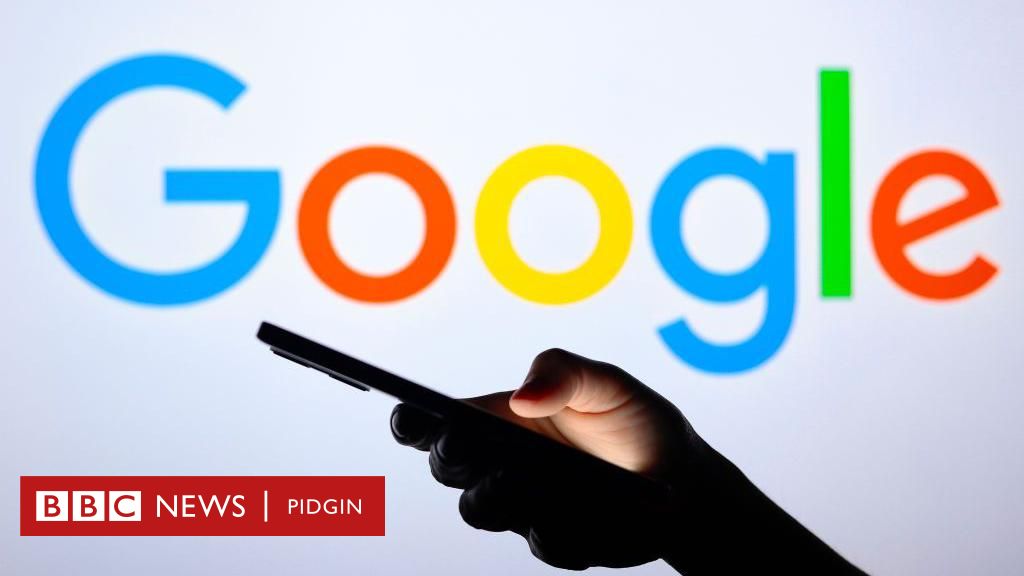Wia dis foto come from, Getty Images
- Author, Tom Gerken
- Role, Technology reporter
-
Di tech world dey try digest di latest US court ruling wey say Google illegally monopolise or kolobi online search and related advertising to diasef.
E take four years to reach dis point, and di fact say Google owner Alphabet go surely appeal dis court decision, mean say dis legal gbas-gbos fit still continue for some time.
But already, di possible consequences of di court decision dey under consideration, from cash fine to oda more complicated remedies.
Di US goment specifically want “structural relief” – so wetin e fit look like?
Breaking up di band
Di nuclear option na to demand make Google break imsef into smaller businesses – option wey US officials no rule out.
Google big pass just using am to do search.
Just look at Android wey dey run for majority of smartphones, Google buy am for $50m (£39.3m) for 2005, or YouTube, wey e buy for $1.65bn for 2006, dem two dey generate multiple times of dat money wey dem bin take buy am every year.
Di argument fit be say make all dis ones still remain under Google, but make dem turn di actual search engine into separate business.
Dis kain option fit to cause kasala for di Alphabet executives. But as long as Google remain di default search engine for pipo devices, di average consumer fit no notice di difference.
Google am
Anoda potential remedy dey based on Google practice of paying oda companies to use am.
US say Google dey currently pay some companies like Apple more dan $10bn a year to pre-install am as default search engine on dia devices or platforms.
Di wahala be say, if to say Google no ever spend dat money, big companies for bin dey encouraged to develop dia own search experience.
Instead, Apple Safari browser for example dey use Google by default whenever you use am to search di web.
If remedial action significantly affect Google ability to pay oda companies to use am, maybe dis oda companies fit become im rival.
Here sha, dem go struggle wit Google incredibly strong customer recognition for search. Despite im own high brand profile, e dey hard to tell pesin make im “Apple” sometin.
And plenty pipo dey download rival browsers on dia devices anyway, so if you dey use Chrome or Firefox for your iPhone for example, you no go notice if Safari search engine change.
Hard to shift
Sometin wey dey easy to imagine n aim be one kain choice screen, wia pipo dem dey ask pipo wey dey open browser for di first time weda dem go like use Google or alternative like Microsoft Bing.
E dey hard to imagine say dem make plenty pipo to abandon Google at once, sake ofdi simple reason say for most pipo, e dey work well.
Those of us wit grey hairs fit remember say Google na one fo di many search engines wey bin come out wen internet first start, wit familiar rivals including Yahoo and Ask (formerly AskJeeves), and possibly oda rivals wey bin no too familiar including Lycos and AltaVista.
But over di next 10 years, Google no just become di main di main player for di market, e kuku become part of how we dey took.
Even though Microsoft launch im rival, Bing, for 2009, notin don fit knock out Google.
Microsoft boss Satya Nadella testify for Google trial, maybe wit hope say dis kain judgement fit finally help give Bing wings.
E go take time
Whatever go happun next, past experience suggest say e no go happun quickly.
For 1999, Microsoft bin find imsef for very similar situation to wia Google dey now.
One US judge just find say di company don create monopoly, and one year later one court order am to break am up.
Microsoft appeal di decision, and for 2001 dem overturn di original decision to break am up.
By end of 2002 Microsoft had agree to settlement wit di US Department of Justice, wey di judge bin accept.
But some US states disagree, and no be until 2004 – five years afta di original ruling – na im dem officially sign off di settlement.

